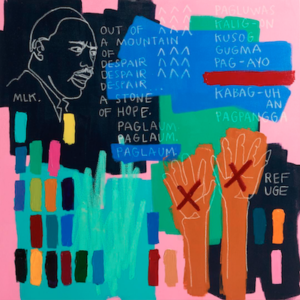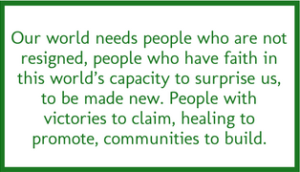“An often forgotten lesson from the Epiphany season is that when God warned the wise men the child was in danger, they immediately acted to protect the boy. Two thousand years later, God still warns the church to protect children–and expects us to act.” -Victor Vieth

On this Martin Luther King, Jr. Day, we would like to share an Epiphany sermon given January 7, 2018 by Rev. Kristin Philipson. It is based on Matthew 2:1-12 and serves as a reminder that each of us has the power to change the world.
The best hockey game I have ever seen – bar none – was the gold medal match at the Sochi Olympics in the winter of 2014. Canada was playing against the United States. The Americans were in the lead, up 2-0 with less than four minutes left in the game – they could practically taste the gold medal in between their teeth – when all of a sudden Canada shoots and scores with the puck just squeaking into the upper right hand corner of the American net. It’s now 2-1 for the USA. Less than three minutes left in the game. The Canadians pull their goalie. With one minute and thirty seconds left on the clock the US takes a long shot at the Canadian net and there’s no player within skating distance to thwart the goal; the US team gets ready to cheer when – boom! – the puck hits the post, just missing the net. One minute left now in the gold medal game and the clock is running down. The Americans are 57 seconds, 56 seconds, 55 seconds away from the top spot on the podium when, with 54 seconds left in the game, Canada scores for the tie and brings the game into overtime.
Now if any of you are real hockey aficionados you might be thinking that you don’t recall Canada and the US playing each other for gold in hockey at the 2014 Winter Olympics. And you’d be right, if you were thinking about men’s hockey. The match I just described, the most memorable hockey game I have ever seen, was played by women. When women’s hockey was first admitted into the Olympics at Nagano in 1998 I am embarrassed to admit that I didn’t think it would be any fun to watch. I’d heard opinionated people say that women’s hockey would be too slow, that it couldn’t be considered hockey because it would be less rough, that the women would somehow be less competitive than the men; that it wouldn’t be the game we knew and loved. Women’s hockey would be less exciting, a lot of us thought, and that was just the way that it was, just how women were made, just the way of the world. But the moral of the story is this: one needn’t be resigned to the way of the world; we must never lose faith in the world’s capacity to surprise us.
This is also the message of Matthew’s story of the magi’s quest to find and worship the infant Jesus: one needn’t be resigned to the way of the world; we must never lose faith in the world’s capacity to surprise us. What a fantastic story we tell every year around the 6th of January – the Feast of the Epiphany – where these magnificent astrologers and philosophers follow a star, to travel who knows how far and who knows how long, perhaps even with whole entourages of vassals and camels, offering up gifts fit for a king.
Most people celebrate Christmas just fine, without any mention of Jesus. Ninety percent of people here in the US were expected to celebrate Christmas this season, but according to a recent survey less than half felt compelled to honor Christmas as a celebration of Jesus’ birth. And so I think it’s fair to ask: when it comes to Jesus, why do church people make such a fuss about him? Why the twelve-day long celebration, just now come to a close? Why this fantastic story? Why make such a big deal about him – with a star and the magi and gold and frankincense and myrrh?
There is an expression we use when we want to describe something normal, something typical, something expected, a condition or state that’s not unusual but to which we are resigned. We call it, “the way of the world.” Oh well, we sigh, isn’t that just the way of the world? Chores and traffic and bills making up our only mail. One could describe the way of the world as certain constants that we must accept or find ourselves in a continual state of disappointment. It’s this kind of resignation that Herod counts on from the people of Judea, that people would see his way as just “the way of the world,” and so no use fighting it. Herod the Great snatched at power in Judea as a seagull would a crust of sandwich or a child at the candy that falls at the sudden burst of a piñata; he was willing to scratch, flap, elbow and shove his opponents in order to hoard it all for himself. Herod was named “King of the Jews,” by the Roman Senate. There was nothing Herod wouldn’t do to solidify the sense that his way was just the way of the world. He built massive fortresses. He was apparently surrounded by a retinue of 2000 body guards. Later, perceiving a threat to his power from within his own family, he executed his wife and two of his own sons.
It’s no wonder, then, that Herod’s worldview is threatened when he hears about a group of magi asking around Jerusalem for “the one who has been born king of the Jews.” If Herod’s worldview is a balloon, the magi’s question is the pin that makes it pop. How many people had the magi asked, Herod wondered? How many citizens of Judea now had doubts about his way and his authority because of this newborn king? “[M]agi from the East came to Jerusalem, asking, ‘Where is the child who has been born king of the Jews?’” It’s such an innocent question, but it threatens to topple Herod’s entire kingdom, his perceived way of the world. People were suddenly making a fuss; there was talk of a great ruler. And if this ruler’s star was on the rise, then perhaps Herod’s was about to fall.
Two small words changed the world this fall: me too. These were the two small words Tarana Burke wished she had said to a young woman who confided in her a history of sexual abuse. Ms. Burke listened to the young woman’s story but didn’t know what to say or how to respond. It was only long afterwards that she realized that solidarity was the most powerful resource she could have offered the young woman. To say, “me too,” is to look long and hard at the way of the world and then to testify to the reality of another way. It’s to say, “I’ve been where you are now and I know as well as you do that what we’ve both gone through should never have happened. People might act like it’s just the way of the world but we both know there’s another way, a better way.” “Just Be, Inc.” is the non-profit organization Ms. Burke developed in response to this conversation with that young woman and “me too” is one of the organization’s slogans.
This past October TV and film star, Alyssa Milano, used Tarana Burke’s phrase to the same end when unfathomable levels of sexual harassment and abuse were revealed among the ranks of Hollywood’s elite: “If all the women who have been sexually harassed or assaulted wrote ‘Me too.’ as a status [on social media] we might give people a sense of the magnitude of the problem,” she wrote on Twitter. In the 24 hours that followed these words were shared more than 12 million times. “Me too” is a movement with this message at its heart: we needn’t be resigned to what we think of as “the way of the world;” there is, and can be, another way. We must never lose faith in the world’s capacity to surprise us.
One of the serious questions the early Christians faced was how they could possibly believe that Jesus was the Messiah – the Christ – the savior of the world, when he had been killed. Jesus’ movement was clearly threatening and the powers of his day sought to have him silenced – isn’t that just the way of the world? “You go ahead and make all the fuss you want to about Jesus,” people must have said to the members of Matthew’s community; “we’ll just keep waiting for a real savior.” The irony of the story of the magi’s quest to find and worship Jesus, the newborn king, is that when Jesus is finally crowned it’s fashioned from thorns and placed on his head by soldiers who mock and taunt him as he walks to his death, a convicted dissident of the Roman Empire. A wooden sign reading, “This is Jesus, King of the Jews,” is nailed above his head as he hangs on the cross.
I went looking for an image to which I could refer for inspiration while writing this sermon and found the one you have inserted into your bulletins. More than five hundred years old, it’s called “The Adoration of the Magi,” by an artist of the Italian Renaissance named Andrea Mantegna and it’s on display at the Getty Centre here in Los Angeles. It’s the perspective in this painting that I find so provocative; the artist painted as though he, too, were kneeling alongside the magi. It’s a perspective that encourages us as viewers to adopt the same stance, to look at this baby as though we, too, have fallen to our knees and are ready to present our gifts.
Some time near the end of his life Andrea Mantegna sat staring at this empty canvas. A few years earlier his beloved wife had died, along with one of his sons. Another son had been banished from for crimes which had brought Mantegna deep shame and humiliation. At one point he had been paid one of the highest salaries of his day when he worked as a court painter for the ruling family of Padua. He might have felt abandoned, an old man, alone, in his studio. But what came into his mind and heart and made it onto his canvas was a story about the One called, “God with us,” the One who whispers to each and every soul, “me too;” you are not alone. I’ve been where you are now, grieving a loss, overwhelmed by the uncertainty of the future, unsure of my legacy, of whether I offer anything of value to this world and I want to assure you that healing will come, direction will come; this world is a home for life and life’s thriving – it has been designed as such.
We must never lose faith in the world’s capacity to surprise us, to recreate and make new. Church people make such a fuss about Jesus because in his life and in his death he shows us that we are not alone, that this is, in fact, God’s wondrous world. It is our conviction that God raised Jesus to new life and so we have faith that what we call the “ways of the world” are not the final way and that they will not receive the final say.
To this truth Herod offers a powerful testimony. If Herod was really convinced that his way was just the way of the world and everyone should just get used to it, he could have ignored the magi and their question; it wouldn’t have disturbed him, festering in his conscience, like a splinter or a hangnail. If Herod was truly convinced that his way was just the way of the world then he could have told the chief priests and the teachers of the law to ignore any questions that came from the people about the newborn ruler. Instead Herod frantically gathers them all for insider advice. In our story Herod reveals that he is, in fact, fully cognizant of another way and he shows us as much because he’s frightened. Herod knows in his bones that he has been trying to thwart this way for a very long time but the real way of the world cannot and will not be held back.
In a world that has known its fair share of Herods, those who maintain that their way is just the way this world operates, what inspires some, like the magi, to ask the innocent questions that might topple entire kingdoms? Questions like, who says women can’t skate as fast or that our game wouldn’t be as exciting as men’s? Questions like, who says no one would believe me, were I to tell my story? Questions like who says I haven’t got anything to say, a message to pass on, a canvas to fill? What inspires us, like the magi, to ask the questions that threaten to topple entire worldviews? Here at church we’d say it is our conviction in another way.
 Our world needs people who are not resigned, people who have faith in this world’s capacity to surprise us, to be made new. People with victories to claim, healing to promote, communities to build. It’s why we here at church make such a fuss about Jesus and why we tell the story of the magi’s quest at this time every year: that we might gain our own epiphany – our own insight, our own reminder – that there is indeed another way of the world. We call it God’s way, this promise to make all things new – it’s a promise for you and for me and for this church community and this city and yes, even Herod. This is God’s wondrous world, and it is constantly surprising.
Our world needs people who are not resigned, people who have faith in this world’s capacity to surprise us, to be made new. People with victories to claim, healing to promote, communities to build. It’s why we here at church make such a fuss about Jesus and why we tell the story of the magi’s quest at this time every year: that we might gain our own epiphany – our own insight, our own reminder – that there is indeed another way of the world. We call it God’s way, this promise to make all things new – it’s a promise for you and for me and for this church community and this city and yes, even Herod. This is God’s wondrous world, and it is constantly surprising.
Rev. Kristin Philipson is normally part of the ministry team at Rosedale United Church in Toronto, Canada but is currently spending a sabbatical year in Los Angeles with her husband and family. She is studying towards her Doctor of Ministry in Preaching from McCormick Theological Seminary at the University of Chicago.



